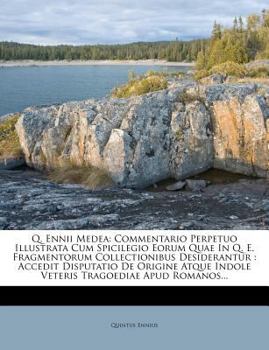Q. Ennii Medea: Commentario Perpetuo Illustrata Cum Spicilegio Eorum Quae In Q. E. Fragmentorum Collectionibus Desiderantur: Accedit Disputatio De Ori
Select Format
Select Condition 
Book Overview
This volume presents Q. Ennius's "Medea," accompanied by a comprehensive perpetual commentary and a collection of excerpts that are missing from existing collections of Q.E. fragments. It further includes a discussion on the origins and nature of ancient tragedy among the Romans. This edition offers valuable insights into one of the foundational works of Roman drama, providing scholars and enthusiasts with a deeper understanding of Ennius's contributions to literature and the development of tragic form.
The inclusion of a detailed commentary enhances the text's accessibility and contextualizes its significance within the broader landscape of classical literary studies. This book serves as an essential resource for anyone interested in exploring the rich heritage of Roman theatrical traditions and the enduring influence of works like "Medea."
This work has been selected by scholars as being culturally important, and is part of the knowledge base of civilization as we know it. This work was reproduced from the original artifact, and remains as true to the original work as possible. Therefore, you will see the original copyright references, library stamps (as most of these works have been housed in our most important libraries around the world), and other notations in the work.
This work is in the public domain in the United States of America, and possibly other nations. Within the United States, you may freely copy and distribute this work, as no entity (individual or corporate) has a copyright on the body of the work.
As a reproduction of a historical artifact, this work may contain missing or blurred pages, poor pictures, errant marks, etc. Scholars believe, and we concur, that this work is important enough to be preserved, reproduced, and made generally available to the public. We appreciate your support of the preservation process, and thank you for being an important part of keeping this knowledge alive and relevant.





